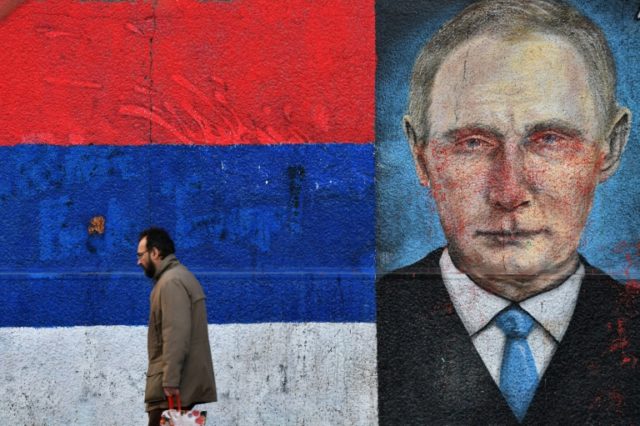Belgrade (AFP) – Russian President Vladimir Putin on Thursday kicked off a state visit to Serbia, where he is set to receive a rock star reception in the capital Belgrade which is preparing a parade in his honour.
“Welcome honoured President Putin, dear friend” read one of many billboards around the city bearing a mix of Russian and Serbian flags.
Putin, whose plane landed at Belgrade Nikola Tesla airport shortly after 1200 GMT, was welcomed by Serbian President Aleksandar Vucic.
Large crowds are expected to celebrate the Russian leader in a parade later in the day that will weave through Belgrade and culminate at the massive Saint Sava church, one of Orthodox Christianity’s largest houses of worship.
In recent days vendors have been selling T-shirts, mugs and books bearing Putin’s face, while a central Belgrade fountain has been lit up with the red, white and blue colours of the Russian flag.
Although Serbia aspires to join the European Union, it has kept up close ties with Russia, its historical “Orthodox big brother” whose people also share Slavic origins.
But it “is more an emotional than a rational relationship”, explained Serbian economic analyst Biljana Stepanovic.
According to a 2017 Serbian government survey, a quarter of the population believe that Russia is their country’s top donor, while the same percentage says it is the EU.
In reality, 75 percent of donations come from the EU or its member states, while Russia doesn’t even make the top nine.
The West also outpaces Russia in terms of direct investment and trade.
However, the affection for Moscow is fanned by its unyielding support on the emotive issue of Kosovo, a former Serbian province that broke away in a 1998-99 guerilla war.
Serbia has never accepted the split and Russia similarly rejects it, wielding its veto power at the United Nations to thwart Kosovo’s dreams of joining.
In return, Belgrade refuses to join the international trade sanctions imposed on Russia over its 2014 annexation of Crimea.
The phrase “Kosovo is Serbia, Crimea is Russia” can sometimes be spotted on Serbian streets.
– Growing NATO sphere –
Aware of his people’s affection for Russia, Vucic has often talked up his relationship with Putin.
On Monday, he described the details of a recent Moscow visit in an interview with the pro-government Pink TV.
“When I went to his house to offer him a (religious) icon, he received me at 10:45 pm, we were alone and he was playing the piano,” said Vucic, who critics accuse of being increasingly authoritarian.
But the fanfare does not mask Russia’s recent setbacks in the Balkans, where the West is muscling in.
Moscow was unable to prevent Montenegro from joining NATO in 2017, a goal which Macedonia is also on the cusp of achieving.
If Macedonia succeeds, all countries bordering Serbia — which does not aspire to join — will be in the NATO sphere, with the exception of Bosnia due to the veto of its Serb population.
Before his arrival, Putin accused the West of “destabilising” the Balkans with efforts to expand NATO, an accusation that the United States often lobs in his direction.
– Puppy present –
According to Serbian media reports, Vucic is expected to present Putin with a puppy of the Sarplaninac breed, a shepherd dog from the region.
The Russian leader meanwhile will give Vucic a decoration.
Maxim Samorukov, an analyst on Russia at the Carnegie Endowment for International Peace, said Putin is visiting Serbia mainly to seek “political prestige” and show that there is a “Russian influence in all parts of the world”.
“The Balkans as such are of little importance” and do not represent “a priority of Russian foreign policy”, he added.
Moscow does, however, have some stake in the region.
Serbia imports two-thirds of its natural gas and crude oil from Russia, while Russian giant Gazprom owns the Serbian oil company NIS.
According to analyst Stepanovic, Russia “has not yet used up” this leverage, “but the potential for influence is there” because Serbia cannot “afford an interruption in deliveries”.

COMMENTS
Please let us know if you're having issues with commenting.